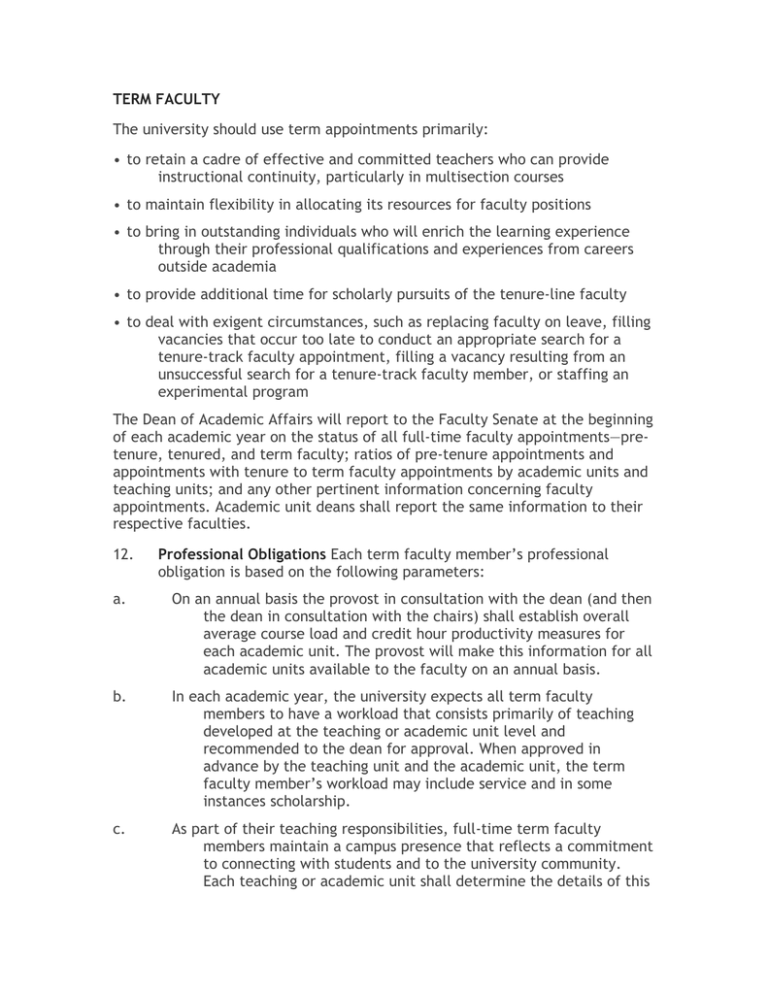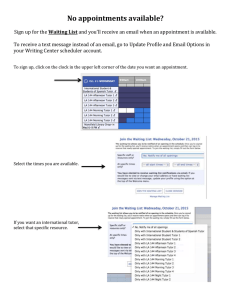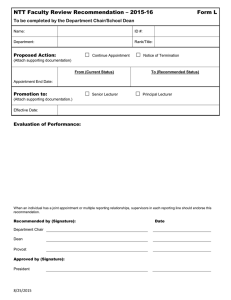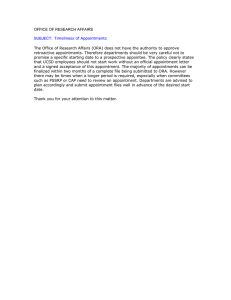TERM FACULTY The university should use term appointments primarily:
advertisement

TERM FACULTY The university should use term appointments primarily: • to retain a cadre of effective and committed teachers who can provide instructional continuity, particularly in multisection courses • to maintain flexibility in allocating its resources for faculty positions • to bring in outstanding individuals who will enrich the learning experience through their professional qualifications and experiences from careers outside academia • to provide additional time for scholarly pursuits of the tenure-line faculty • to deal with exigent circumstances, such as replacing faculty on leave, filling vacancies that occur too late to conduct an appropriate search for a tenure-track faculty appointment, filling a vacancy resulting from an unsuccessful search for a tenure-track faculty member, or staffing an experimental program The Dean of Academic Affairs will report to the Faculty Senate at the beginning of each academic year on the status of all full-time faculty appointments—pretenure, tenured, and term faculty; ratios of pre-tenure appointments and appointments with tenure to term faculty appointments by academic units and teaching units; and any other pertinent information concerning faculty appointments. Academic unit deans shall report the same information to their respective faculties. 12. Professional Obligations Each term faculty member’s professional obligation is based on the following parameters: a. On an annual basis the provost in consultation with the dean (and then the dean in consultation with the chairs) shall establish overall average course load and credit hour productivity measures for each academic unit. The provost will make this information for all academic units available to the faculty on an annual basis. b. In each academic year, the university expects all term faculty members to have a workload that consists primarily of teaching developed at the teaching or academic unit level and recommended to the dean for approval. When approved in advance by the teaching unit and the academic unit, the term faculty member’s workload may include service and in some instances scholarship. c. As part of their teaching responsibilities, full-time term faculty members maintain a campus presence that reflects a commitment to connecting with students and to the university community. Each teaching or academic unit shall determine the details of this obligation. d. Generally, term faculty members teach six courses per academic year; however, this may vary by teaching unit. An exception in this instance is valid only when all parties involved have agreed to it in writing. The actual course assignments per individual faculty member will vary as defined by the teaching unit or academic unit. Final determination of all course loads rests with the dean in consultation with the teaching unit chairs. 13. When recommending a term faculty member’s workload assignment to the dean for an academic year, the teaching unit or academic unit may consider, but is not limited to, the following: the scope and intensity of course preparation; supervision of student scholarship and internships; credit hours taught; size of classes; teaching-related activities, such as contact hours, advising, laboratory or studio time, and fieldwork; contributions to internal (such as major committee assignments) and external service; and scholarship, if applicable to the position. 14. Academic Ranks and Qualifications a. Full-Time Faculty Ranks for Term Faculty The designated ranks for full-time faculty members with term appointments are instructor, professorial lecturer, senior professorial lecturer, Hurst Senior Professorial Lecturer, assistant professor, associate professor, and professor. i. Instructor For term faculty members who do not hold a terminal degree in their field, the rank of instructor is a temporary one-semester or one-year appointment. The university usually appoints these faculty members to provide instruction to undergraduate students in such programs as writing, foreign language, mathematics, and other skills areas of the curriculum. Reappointments are subject to annual review. Teaching and academic units evaluate instructors primarily on their teaching and, if applicable, service to the teaching unit or academic unit. ii. Professorial Lecturer Term faculty members are awarded the rank of professorial lecturer if they (1) have demonstrated successful teaching in the rank of instructor for a period of three years, or (2) hold the terminal degree in the field, or (3) have professional experience and achievement equivalent to a terminal degree. They are customarily hired to provide instruction at the undergraduate level. The term of these appointments may range from one to five years, depending on the needs of the teaching unit. After five years of service, professorial lecturers are eligible for promotion to one of two ranks: senior professorial lecturer or assistant professor. iii. Senior Professorial Lecturer The rank of senior professorial lecturer recognizes the contributions of faculty members who have served in the rank of professorial lecturer and have demonstrated superior performance as a teacher. An academic unit may also appoint to this rank those who have equivalent professional experience. Senior professorial lecturer appointments may range from three to five years, depending on the needs of the teaching unit. Evaluation is primarily on the basis of teaching performance and, if applicable, service to the teaching unit. iv. Hurst Senior Professorial Lecturer This rank, named for American University’s founder, is a term appointment an academic unit awards to a senior professorial lecturer who has provided particularly meritorious performance to the university over a period of years or to a new faculty member whose previous career and experience are notably prestigious. v. Assistant Professor (Associate Professor, Professor) Term faculty members who are promoted or appointed to assistant professor (or other standard professorial ranks) must hold the terminal degree in the field or have equivalent professional experience and have demonstrated achievement in both scholarship and teaching. Evaluation of faculty members holding this rank will include consideration of scholarship commensurate with the rank as defined by the teaching unit. In unusual cases, if warranted by programmatic needs, a teaching unit or academic unit may award this rank to a candidate for an initial appointment or to a candidate for an appointment after less than the standard five years at the university. Recommendations for appointment to these ranks will be reviewed by the Committee on Faculty Actions. b. i. Additional Types of Term Faculty Appointments Research Faculty The university may grant a person engaged primarily in scholarship or professional activities relevant to the work of the university an appointment to the research faculty. Following the same review procedures as term faculty appointments, a teaching unit or academic unit may recommend the rank of research assistant professor, research associate professor, or research professor provided that the research faculty member possesses the educational and scholarship qualifications appropriate to the particular rank. The teaching unit or academic unit will clearly express the nature and extent of the duties of persons appointed with such titles. The university will provide the description of duties in a letter of appointment. Such an appointment does not confer membership in the faculty. The teaching unit and academic unit recommend research faculty appointments and reappointments, subject to the Provost’s approval according to procedures the Provost has established. A research faculty appointment expires at the end of the appointment period unless it is renewed according to the procedures the Provost sets out. Members of the research faculty should not expect employment beyond the contract period. These appointments carry no implications of or credit towards academic tenure. Research appointments may be either part-time or full-time. Persons having such an appointment will normally have sources outside the university fund their salary. Exceptions will require the Provost’s written approval upon recommendation of the teaching unit and/or academic unit. Research faculty members are entitled to specific resources and access to specific facilities of the university as the dean of the academic unit or director of center or institute to which they have been appointed determines. ii. Visiting Faculty The university may appoint a person who is on leave from the full-time teaching faculty of an accredited college or university or from a comparable educational, scholarship, or policy institution as a full-time term faculty member at the rank of visiting assistant professor, visiting associate professor, or visiting professor. The qualifications for each rank are the same as for initial appointments of a tenure-line faculty member. The university may make or renew visiting appointments using the criteria and guidelines for term faculty. Visiting faculty members are entitled to specific resources and access to specific facilities of the university as the dean of the academic unit to which they have been appointed determines. The conditions and perquisites of employment for visiting faculty are not the same as those of tenure-line faculty; the rules, policies, and procedures for term faculty apply. iii. Faculty Fellows Occasionally faculty members or scholars from another institution may wish to have a short-term affiliation with the university for the purpose of pursuing scholarship or participating in other scholarly, creative, or professional activities. These individuals receive no compensation from American University but may participate in campus activities that are of mutual benefit to the individual and the university. The university may grant the title of faculty fellow to such individuals with the understanding that they may receive privileges consistent with university policies, as determined by the dean of the academic unit or director of a center or institute. The appointment process follows that of adjunct appointments for the unit. iv. In-Residence Faculty An in-residence faculty appointment allows for flexibility when there is a desire to provide for the presence of a distinguished and prominent individual at the university. The positions that are given in-residence designation include, but are not limited to, writer, artist, diplomat, poet, scholar, lecturer, executive, journalist, emeritus, and emerita. In-residence faculty members who are reappointed may be awarded the rank of senior writer in-residence, senior poet in-residence, or other appropriate designation, following the unit’s criteria for the term faculty rank of senior professorial lecturer. In limited circumstances, an in-residence appointment may be made on a less than full-time basis. c. Washington Semester Program Faculty The Washington Semester Program enhances many teaching units throughout the university and contributes to the university’s national and international reputation. Its full-time faculty members hold the same ranks as term faculty and are evaluated with concern for excellence. Persons appointed as full-time faculty members in the program incur the responsibilities and enjoy the benefits of university faculty but are not eligible for tenure. Washington Semester Program faculty members are eligible for renewable contracts. d. Emeriti and Emeritae Term Faculty Emeritus and emerita status is an honor generally conferred on retiring faculty members after active service of approximately ten years or more. Usually a designated committee or faculty member from the candidate’s teaching unit or academic unit initiates the process with a brief letter of commendation to the Dean of Academic Affairs. The faculty member’s chair and dean may add letters before the Provost makes a decision. Faculty who are designated as emeriti or emeritae are entitled to reasonable use of the facilities of the university consistent with the needs of the institution and with past custom and practice and specified in the retirement agreement. Emeriti and emeritae faculty have voting membership in the faculty as defined in the Academic Regulations and in the bylaws of their teaching or academic units. They may serve on committees and perform such other occasional services as are in keeping with their desires and capabilities and with the needs of the university. Faculty emeriti and emeritae who teach for the university after retirement shall be accorded the title of emeritus or emerita in residence. 15. Term Faculty Appointments and Reappointments a. Faculty Action Procedures for Term Faculty In recommending term faculty appointments or reappointments, the teaching unit must specify in writing the duties of the term faculty member and the means for evaluating the faculty member’s performance. Each teaching unit or academic unit will establish the process for appointing and reappointing term faculty. The process should provide a means for recommending whether to reappoint a term faculty member beyond the initial one- or two-year period. If the teaching or academic unit approves reappointment beyond the initial period, it must also determine the length of the reappointment period, which can be from one to five years. The academic unit dean and the Dean of Academic Affairs must approve all decisions to appoint and reappoint term faculty. If there is a disagreement between a teaching unit and its dean, the dean will send the file to the Committee on Faculty Actions and subsequently to the Dean of Academic Affairs for a final decision. If a term faculty member is subsequently appointed to a tenure-track position, the faculty member may waive all or part of prior American University service in accordance with the subsection “Pre-tenure Credit for Prior Service,” contained in “Provisions for Faculty Appointments in Tenure-Line Positions” in this Manual. b. Contractual Terms of Service Initial Appointments: The university customarily makes initial term faculty appointments for one or two years. When the performance of a term faculty member under an initial contact is substantially less than satisfactory, as determined by the dean in consultation with the chair, the Provost may dismiss the faculty member before the contract expires. This unusual action would normally, but not always, be related to teaching. A term faculty member dismissed for unsatisfactory performance during the initial appointment term is not entitled to the process outlined in “Disciplinary Procedures” in this Manual. However, the term faculty member dismissed under such circumstances has the right to contest the termination decision, using the university’s grievance procedure for faculty. Reappointments: The university may reappoint term faculty for periods of from one to five years. There is no limit on the number of such reappointments. Reappointments are contingent upon the satisfaction of the general criteria for the evaluation of faculty members contained in “General Criteria for Evaluation of Faculty” in the tenure-line portion of this Manual, the specific criteria the individual teaching unit sets, and the criteria for particular ranks outlined in the term faculty “Academic Ranks and Qualifications” section of this Manual. c. Notice for Appointment, Reappointment, or Termination The university shall state the precise terms and conditions of all appointments in writing to the appointee. The letter of appointment will include a specific reference to this Faculty Manual, which is available on the Office of the Dean of Academic Affairs web site. Term faculty appointments are for a specified term or duration. This means that these appointments naturally expire on the end date of the term without further action from the university. Term faculty should not expect employment beyond the appointment period. However, it is the intention of the university that it will advise individually by letter as early as possible in the academic year all full-time members of the teaching faculty (except those in a visiting status and those with temporary or emergency appointments) whether the university will reappoint them, and in cases of reappointment, the terms and conditions thereof. The university may reappoint members of the term faculty to a succeeding academic year only by notice from the Dean of Academic Affairs. If a term faculty member does not receive notice, it is the faculty member’s responsibility to inquire of the Dean of Academic Affairs, through the teaching unit chair, who will respond with a status report. Notwithstanding the university’s intention to provide notice of reappointment, the lack of notice is not to be construed as reappointment. d. Resignations A faculty member who wishes to resign from the university while under contract must submit a written request to the teaching unit chair or academic unit dean. The request shall then be tendered to the Dean of Academic Affairs, who will notify the faculty member whether the resignation is accepted and any related conditions, including effective date of resignation. e. Death While on Active Service When a full-time term faculty member with ten years or more of continuous full-time service to the university dies while on the active rolls of the university, the university will pay a lump sum equal to twenty percent of the member’s base annual salary to the representatives of the decedent’s estate.



